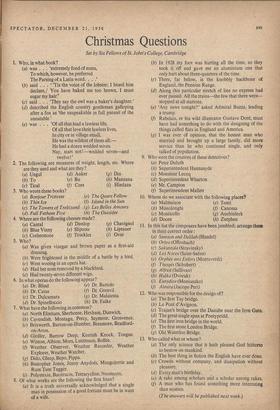Christmas Questions
Set by Six Fellows of St. John's College, Cambridge
1. Who, in what book?
(a) was . . . 'extremely fond of sums, To which, however, he preferred The Parsing of a Latin word. . .
(b) said . . . "Tis the voice of the lobster; I heard him declare,/ You have baked me too brown, I must sugar my hair.'
(c) said . . . 'They say the owl was a baker's daughter.'
(d) described the English country gentleman galloping after a fox as 'the unspeakable in full pursuit of the uneatable.'
was . . . 'Of all that lead a lawless life, Of all that love their lawless lives, In city or in village small, He was the wildest of them all;— He had a dozen wedded wives.
Nay, start not ! —wedded wives—and twelve!'
2. The following are measures of weight, length, etc. Where are they used and what are they?
(a) Ungul (d) Anker (g) Din (b) To (e) Bu (h) Manzana (c) Tical (f) Coss (i) Hindaza 3. Who wrote these books?
(a) Bonjour Tristesse (e) The Quare Fellow (b) Thin Ice (f) Island in the Sun
(c) The Towers of Trebizond (g) Les Belles Amours
(d) Full Fathom Five (h) The Outsider
4. Where are the following cheeses made?
(a) Cantal (d) Dunlop (g) Chavignol (b) Blue Vinny (e) Slipcote (h) Liptauer (c) Cotherstone (f) Truckles (i) Ovar 5. Who?
(a) Was given vinegar and brown paper as a first-aid dressing.
(b) Were frightened in the middle of a battle by a bird.
(c) Went wooing in an opera hat.
(d) Had her nose removed by a blackbird.
(e) Had twenty-seven different wigs.
6. In what operas do the following appear? (e) Dr. Bartolo (f) Dr. Grenvil (g) Dr. Malatesta (h) Dr. Falke
(e)
(a) Dr. Blind (b) Dr. Caius (c) Dr. Dulcamara (d) Dr. Spinelloccio 7. What have the following in common?
(a) North Elmham, Sherborne, Hexham, Dunwich.
(b) Cavendish, Montagu, Percy, Seymour, Grosvenor.
(c) Brixworth, Barton-on-Humber, Breamore, Bradford- on-Avon.
(d) Girdler, Barrow Deep, Kentish Knock, Tongue.
(e) Winton, Albion, Mors, Lutzmann, Bolide.
(f) Weather Observer, Weather Recorder, Weather Explorer, Weather Watcher.
(g) Dido, Gleep, Bepo, Pippa. (h) Bustopher Jones, Jenny Anydots, Mungojerrie and Rum Tum Tugger.
(i) Polymixin, Bacitracin, Tetracycline, Neomycin. 8. Of what works are the following the first lines?
(a) It is a truth universally acknowledged that a single man in possession of a good fortune must be in want of a wife.
(b) In 1928 my foot was hurting all the time, so they took it off and gave me an aluminium one that only hurt about three-quarters of the time.
(c) There, far below, is the knobbly backbone of England, the Pennine Range.
(d) Along this particular stretch of line no express had ever passed. All the trains—the few that there were— stopped at all stations.
(e) 'Any news tonight?' asked Admiral Buzza, leading a trump.
(f) Rabelais, or his wild illustrator Gustave Dore, must have had something to do with the designing of the things called flats in England and America.
(g) 1 was ever of opinion, that the honest man who married and brought up a large family, did more service than he who continued single, and only talked of population.
Who were the creators of these detectives?
(a) Peter Duluth (b) Superintendent Hannasyde (c) Monsieur Lecoq (d) Superintendent Wharton (e) Mr. Campion (f) Superintendent Mallett Whom do we associate with the following places?
(a) Malmaison (e) Tomi (b) Missolonghi (f) Canossa (c) Monticello (g) Auchinleck (d) Doorn (h) Zutphen In this list the composers have been jumbled; arrange them. in their correct order : (a) Samson and Delilah (Handel) (b) Orfeo (Offenbach) (c) Sakuntala (Stravinsky) (d) Les Noces (Saint-Saens) (e) Orphee aux Enters (Mon teverdi) (f) Thespis (Schubert) (g) Alfred (Sullivan) (h) Halka (Dvorak) (i) Eurydice (Moniuszko) (j) A lmira (Jacopo Peri) Who was responsible for the design of?
(a) The first Tay bridge.
(b) Le Pont d'Avignon.
(c) Trajan's bridge over the Danube near the Iron Gate.
(d) The great single span at Pontypridd.
(e) The first iron bridge in the world.
(f) The first stone London Bridge.
(g) Old Waterloo Bridge. Who called what or whom?
(a) The only science that it bath pleased God hitherto to bestow on mankind.
(b) The best thing in fiction the English have ever done.
(c) Crowds without company, and dissipation without pleasure.
(d) Every man's birthday.
(e) A rake among scholars and a scholar among rakes.
(f) A man who has found something more interesting than women.
(The answers will be published next week.)


































 Previous page
Previous page